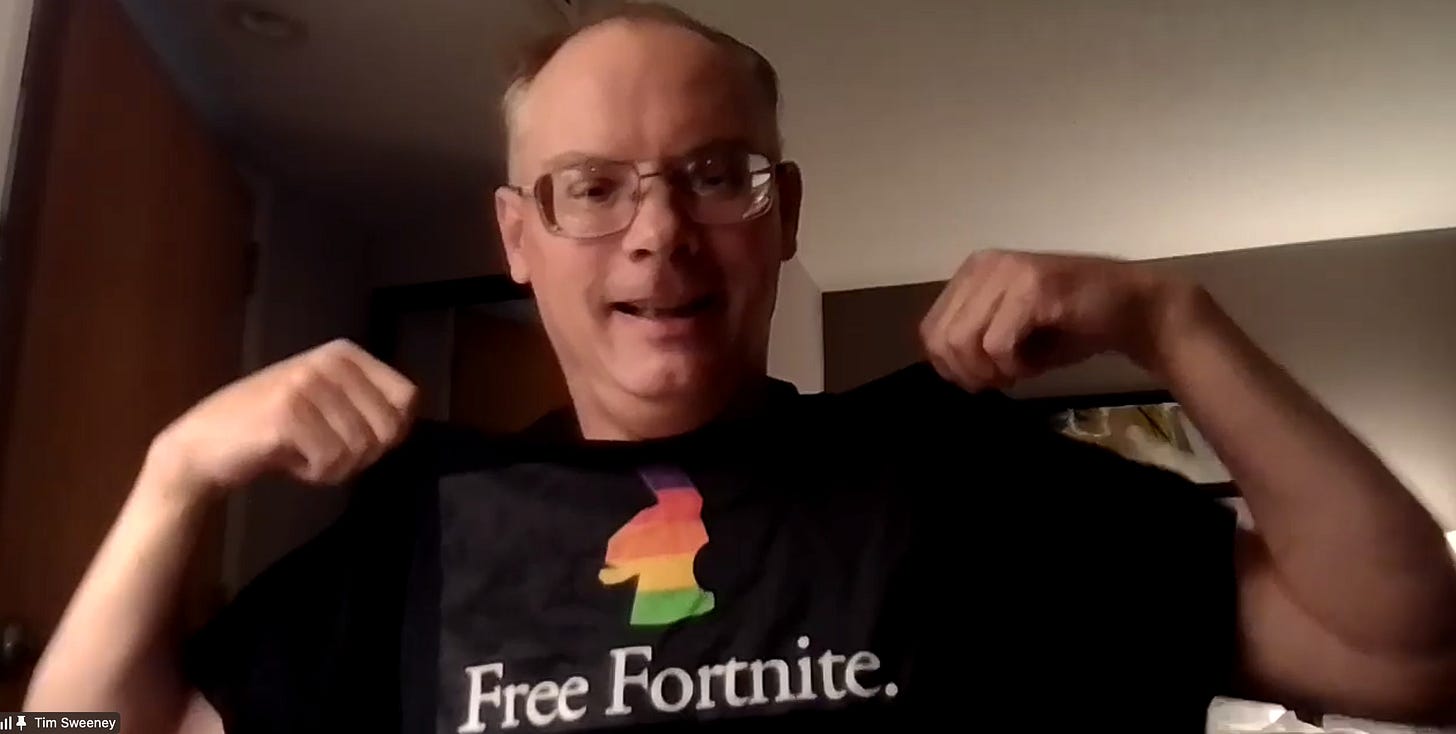Epic offers Fortnite 'peace proposal' to Apple, after searing court ruling against iPhone maker
Game File spoke with an ebullient Tim Sweeney after Epic's win. Apple, facing a potential criminal investigation into its conduct, plans to appeal.
With iPhone nearby and a Burger King cup to drink from, Epic Games CEO Tim Sweeney was in a joyful mood on Wednesday evening, following a big legal win for the company that could upend Apple’s iOS marketplace in the United States.
In an 80-page ruling, judge Yvonne Gonzalez Rogers of the Northern District of California, ruled that Apple violated terms of a court order in the ongoing Epic-Apple legal battle and had lied about it.
This one’s complicated, but could be a big deal.
Reminder: Epic and Apple went to war in 2020 after Epic broke Apple’s rules and added an alternative, cheaper purchase option in Fortnite on iOS. That option let players buy in-game items right from Epic, circumventing Apple’s 30% fee (or tax, as Epic puts it) that developers have to pay on in-app purchases. Apple quickly kicked Epic off the store. Anticipating all of this, Epic sued Apple saying the iPhone maker wielded illegal monopolistic control over the marketplace on its phones and tablets. Epic mostly lost the case, but a judge ruled in 2021 that Apple had to allow developers to inform app users that they could make purchases for their app on outside websites (that might offer better, cheaper deals). Apple complied but applied a 27% fee (or tax, as Epic puts it) on off-app purchases. Epic and others cried foul, saying the new fee essentially removed any pricing advantage for developers.
Today, following Epic’s legal efforts to convince the court that Apple had not properly complied with the 2021 ruling, Gonzalez Rogers issued an intense rebuke of Apple.
She ordered the company to immediately cease the 27% fees and set up a possible criminal investigation into Apple’s handling of the court order.
“This is an injunction, not a negotiation,” she wrote. “There are no do-overs once a party willfully disregards a court order.”
From the judges’ ruling:
Apple willfully chose not to comply with this Court’s Injunction. It did so with the express intent to create new anticompetitive barriers which would, by design and in effect, maintain a valued revenue stream; a revenue stream previously found to be anticompetitive. That it thought this Court would tolerate such insubordination was a gross miscalculation. As always, the coverup made it worse. For this Court, there is no second bite at the apple.
Apple issued a brief statement in response: “We strongly disagree with the decision. We will comply with the court’s order and we will appeal."
But Sweeney was ready to talk a lot.
On Twitter/X, he promised the prompt return of Fortnite to iOS and proposed a “peace proposal”:
We will return Fortnite to the U.S. iOS App Store next week.
Epic puts forth a peace proposal: If Apple extends the court's friction-free, Apple-tax-free framework worldwide, we'll return Fortnite to the App Store worldwide and drop current and future litigation on the topic.
Then he jumped on a Zoom call with Game File and other reporters from The Washington Post, BBC, The Verge, Polygon, Financial Times, The Game Business.
Early in the call he held up an important accoutrement: his iPhone.
“I've been fighting Apple for a long time, but I'm an iPhone customer,” Sweeney said, phone in hand.
“This is an awesome device. I love having it. And I don't love the policies that Apple has made with respect to stores.
“But there's a lot of respect of Epic towards Apple's quality of products and focus. And we see a way for Apple to get back on the right side of history here and for every way to continue.”
Gonzalez Roger’s ruling makes for colorful reading as she excoriates Apple for its handling of her order to allow app users to be directed to external payment options. Apple’s 27% fee, she said, was designed to “maintain its anti-competitive revenue stream.”
Then there’s this:
In stark contrast to Apple’s initial in-court testimony, contemporaneous business documents reveal that Apple knew exactly what it was doing and at every turn chose the most anticompetitive option. To hide the truth, Vice-President of Finance, Alex Roman, outright lied under oath. Internally, Phillip Schiller had advocated that Apple comply with the Injunction, but Tim Cook ignored Schiller and instead allowed Chief Financial Officer Luca Maestri and his finance team to convince him otherwise. Cook chose poorly.
Gonzalez Rogers said Apple’s actions “meets the clear and convincing standard to find a violation” and is referring the matter to the United States Attorney in the Northern District of California “a to investigate whether criminal contempt proceedings are appropriate.”
(Read the full 80-page ruling here.)
For Sweeney, today was the kind of win he’s sought after committing over $1 billion in legal fees and lost revenue in the fight against Apple and Google over alleged monopolistic management of their phones’ ecosystems.
“Apple's ruling is an immediate victory for all developers, because now every developer has the choice of doing their own payment processing, side by side with Apple's and passing on savings,” Sweeney told Game File.
“Developers could use Stripe or XSolla or PayPal or any of the other dozens of payment processing service, and give consumers a better deal on in-app purchases.”
As far as Fortnite coming back to iOS, its absence hasn’t entirely been Epic’s choice.
Apple had blocked Epic’s developer account following the company’s Fortnite payment stunt in 2020, but Sweeney said it has other developer accounts it could use to try to restore it, including the one it used to bring Fortnite and other Epic apps to iPhones in Europe last year, after regulators there said Apple couldn’t block them.
Sweeney said Apple should take Epic back promptly.
“They had said back when the court's decision was handed down, that when the Issues had been finally adjudicated, then the dispute would be over, and they welcome us back,” Sweeney told Game File.
“So, well, I hope that's still true.
“It doesn't serve anybody's interests for Apple to block Fortnite from any users under Epic's proposal. There are a billion iOS users. There were 100 million monthly active users in Fortnite in December of last year. There's a massive, massive overlap in audiences.”
Game File twice asked Apple this evening wha they made of Epic’s “peace plan” and inquired once if they’d permit Fortnite’s return next week. They did not reply to those questions, while issuing a statement on the ruling.
Sweeney said he has given up hope that legal action in the U.S. can get Apple to permit competing app stores on the iPhone. He’d love to get the Epic Game Store app onto iPhones across America. On that front, he said he’s hoping legislation will be passed in the U.S. that would compel Apple to offer competing stores on iOS.
Correction - 10:51pm: Sweeney described his offer as a “pease proposal,” not a “peace plan.”





I’m stuck somewhere in the middle in all this stuff. Apple invested untold and godly amounts of money to develop the iPhone and the App Store, so it feels like they should be able to set the rules and commission they earn as they see fit. Epic wouldn’t have the option to make their billions on the App Store if Apple didn’t have the successful product they do, so Epic should just pay the commission or tax or whatever they want to call it. Every other storefront, aside from Epic’s massive failure, charges 30%. It’s not an egregious amount, it’s industry standard.
Epic is always welcome to start their own mobile phone business and then charge, or not charge, whatever they see fit. They obviously won’t do that because it’s not as simple as flipping on a light switch. It’s extremely difficult to do so.
On the flip side, smaller developers should be charged less than the 30% (I believe in recent years Apple made this change, charging a smaller fee on the first $1m, but I could be wrong). Many very small, one or two person dev teams, could use that break to make an actual living on the App Store, which leads to better apps in the future.